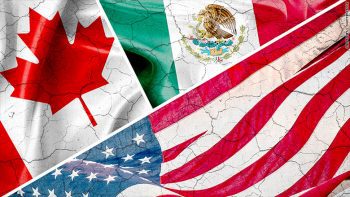December 14th, 2017
Contributing writer for Wake Up World
One of the key selling points of Donald Trump’s campaign, refusing to sign the Trans-Pacific Partnership (or TPP) once he was in office inspired a measure of confidence in the newly elected president. However, next up on the political chopping block is another contentious trade agreement — the North American Free Trade Agreement (or NAFTA).
Even though proponents of NAFTA promised that the agreement would create new jobs and more prosperity in the U.S. — an investigation by the Economic Policy Institute found the opposite to be true. Upon analysis in September of 1997, “reduction in net exports to Mexico has eliminated 227,663 U.S. job opportunities since 1993, and the reduction in net exports to Canada has eliminated 167,172 job opportunities in the same period. In total, NAFTA resulted in a net loss of 394,835 jobs in its first three years.”
The EPI study goes on to note the agreement has had a devastating effect on the U.S. economy:
“In 1993, the year before the agreement took effect, the U.S. had a trade surplus of $635 million with Mexico (all figures in constant 1987 dollars). By 1996, this had fallen to a deficit of $18.8 billion. The already existing deficit with Canada grew even larger, from $16.7 billion to $29.5 billion during those three years.”
Current figures are bleak. The United States has lost nearly 6 million manufacturing jobs and the U.S. trade balance with Mexico has shifted from a surplus in 1994 to deficits over $60 billion.
But the U.S. isn’t the only country negatively impacted by NAFTA, a path of destruction has swept through Mexico as well. Since adopting the agreement, Mexico’s real wage declined and unemployment shot up. With heavily subsidized corn from the U.S. flooding into the country, small Mexican farmers couldn’t compete. Some two million farmers went out of business, not to mention consumer food prices rose — leaving 20 million Mexicans in “food poverty.” When you have high levels of poverty, organized crime recruitment becomes easier, which in turn, breaks down communities. Ultimately, the U.S. suffers as border activity with drug and arms smuggling, along with undocumented migrants, spikes. When Mexico loses, so does the United States.
False Promises, Vague Solutions
U.S. Trade Representative Robert Lighthizer echoes Trumps promise to renegotiate NAFTA and create a “fair deal,” adding that the trade agreement has hurt too many Americans by closed factories, exported jobs, and broken political promises. To this end, Trump has released a 17-page document with the aim of reducing burdensome U.S. trade deficits with Mexico and terminating the corporate run dispute settlement protocol that has created ongoing controversy since the agreement was put into effect.
“I want to make a pledge to each and every one of you: No longer are we going to allow other countries to break the rules, steal our jobs and drain our wealth. And it has been drained. It has been drained,” said President Donald Trump at the kick-off of the White House “Made in America” week, when his NAFTA renegotiation plan was released.
So far, so good. However, as with all things involving nations and governments, the devil is in the details — and the Trump administration, along with a band of corporate attorneys who are slated to enter into another round of NAFTA negotiations this week (December 11-15th) in Washington D.C., have labor unions, industry experts, activists and average citizens alarmed.
“Trade analysts say the plan is vague and sounds a lot like the Trans-Pacific Partnership, a 12-country trade deal that included Canada and Mexico. On the campaign trail, Trump called the TPP, quote, “a continuing rape of our country.” He then withdrew the U.S. from the deal in one of his first acts as president. Meanwhile, labor leaders criticized the new NAFTA plan, saying it worsens protections for workers. AFL-CIO President Richard Trumka said, quote, “Small changes around the edges — or the insertion of disastrous Trans-Pacific Partnership provisions — are not acceptable and would be the ultimate in hypocrisy.” [source]
While the president continues to trumpet his message about making America great again by bringing back jobs from overseas — without offering anything beyond vague promises on how to do this — Lori Wallach, director of Public Citizen’s Global Trade Watch and author of The Rise and Fall of Fast Track Trade Authority, tells Amy Goodman of Democracy Now! exactly what needs to happen in order to turn the U.S. around:
“It doesn’t matter if you’re a Democrat or Republican or from Mars. These are the only things that are going to change the numbers. And in that, getting rid of the incentives that exist in NAFTA, investor protections to offshore jobs, getting rid of the ban on “buy local” and Buy American, which off shores our tax dollars instead of reinvesting them to create jobs at home, putting in environmental, labor and wage standards that are strong and real, not the fluff from TPP, and enforcing them, so you actually have to meet the standards before you get the benefits of the agreement — those kinds of real changes.”
But when Trump’s Press Secretary Sean Spicer was asked by a reporter during “Made in America” week if this meant that the Trump Organization and Ivanka Trump brands would pledge to stop manufacturing their products abroad, he was told that it’s obviously “inappropriate to discuss how anything would affect their own companies. But I can tell you that in some cases, there are certain supply chains or scalability that may not be available in this country.”
Another disturbing trend with the NAFTA negotiation is the complete lack of transparency in issuing detailed goals and draft texts for public review. Moreover, as reported by Public Citizen:
“Already the 500 corporate trade advisers who got us into the TPP have been consulted on NAFTA renegotiations, while the few labor advisers were shut out of that March meeting. And the public and Congress are being left in the dark about negotiating plans and goals.”
Sounds like we are, once again, thick into a TPP-style trade agreement under the guise of ‘improving’ NAFTA for the benefit of U.S. jobs. Only this time, the president himself has vested business interests in the outcome of the agreement.
“Trump’s conflicts of interest and self-dealing opportunities with NAFTA renegotiation are not hypothetical; the sprawling Trump business empire has 14 Canadian and two Mexican investments. Some of Trump’s clothing line is made in Mexico. Trump won’t divest his business holdings or release his tax returns, so unless he reveals his full Mexican and Canadian business dealings, we won’t even know in whose interest these NAFTA talks are being conducted.” [source]
Not many feel optimistic about the renegotiation, except maybe the corporations pulling the strings behind the scenes. If a small shred of hope does remain that Trump will come through and do right by the American people, Public Citizen leaves us with this sobering thought:
“Trump’s broken promises on trade are piling up. Instead of punishing firms that offshore American jobs, he has awarded United Technologies 15 lucrative new government contracts even after they proceeded to offshore 1,200 of their 2,000 Indiana Carrier jobs. Instead of enacting the promised “get tough on China” trade policy, he flip-flopped on his pledge to declare China a currency manipulator on Day One and has done nothing to counter our massive $347 billion China trade deficit.”
If there was ever was a time to contact your Congressmen about NAFTA, it would be now.
Article sources:
- https://www.washingtonpost.com/…/trade-deals-a-closely-held-secret-shared-by-more-than-500-advisers/…story.html
- https://www.reuters.com/article/us-usa-trade-nafta/upgrade-with-a-dab-of-tpp-may-be-u-s-recipe-for-nafta-revamp…
- https://www.democracynow.org/2017/7/18/the_ultimate_hypocrisy_trump_plan_to
- https://www.citizen.org/media/press-releases/will-nafta-renegotiation-produce-tpp-20-and-intensify-damage
- http://www.epi.org/publication/issuebriefs_ib120/
- https://www.commondreams.org/views/2014/01/10/after-20-years-nafta-leaves-mexicos-economy-ruins
- https://www.nytimes.com/…/what-weve-learned-from-nafta/under-nafta-mexico-suffered-and-the-united-states-felt-its-pain
Recommended articles by Carolanne Wright:
- Scientists Warn Chemotherapy Treatment May Encourage Aggressive Tumors and Spread Cancer
- Renowned Harvard Psychologist Says ADHD is Largely a Fraud
- Hyperbaric Oxygen Treatment Reverses Fibromyalgia in 70% of Patients, Researchers Find
- Wealth and Social Media Breed Narcissism and Lack of Empathy, Says New Research
- Over 100 Scientific Studies Agree: Cannabis Annihilates Cancer
- If You Care About Animals and the Earth, Here’s Why You Need to Boycott Palm Oil Immediately
- Latest Research on CBD Oil Offers New Hope for Healing Leaky Gut Syndrome and Autoimmune Disorders
- Scientific Breakthrough: Alzheimer’s Ultrasound Therapy Fully Restores Memory Function in Mice
- Why You Should Have a Himalayan Crystal Salt Lamp in Every Room of Your House
- New Research Links Hand Sanitizer Use With Thyroid Cancer
About the author:
I’m Carolanne — a writer, chef, traveler and enthusiastic advocate for sustainability, organics and joyful living. It’s good to have you here. If you would like to learn more, connect with me at Thrive-Living.net or visit Twitter.com/Thrive_Living.
If you've ever found value in our articles, we'd greatly appreciate your support by purchasing Mindful Meditation Techniques for Kids - A Practical Guide for Adults to Empower Kids with the Gift of Inner Peace and Resilience for Life.
In the spirit of mindfulness, we encourage you to choose the paperback version. Delve into its pages away from screen glare and notifications, allowing yourself to fully immerse in the transformative practices within. The physical book enriches the learning process and serves as a tangible commitment to mindfulness, easily shared among family and friends.
Over the past few years, Wake Up World has faced significant online censorship, impacting our financial ability to stay online. Instead of soliciting donations, we're exploring win-win solutions with our readers to remain financially viable. Moving into book publishing, we hope to secure ongoing funds to continue our mission. With over 8,500 articles published in the past 13 years, we are committed to keeping our content free and accessible to everyone, without resorting to a paywall.








